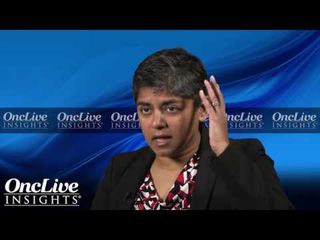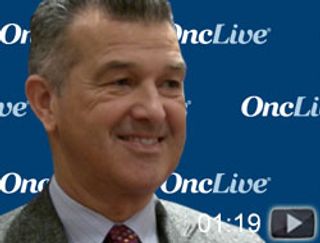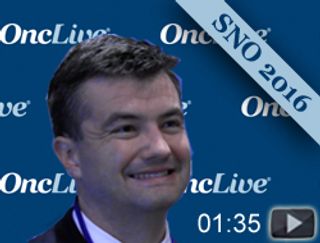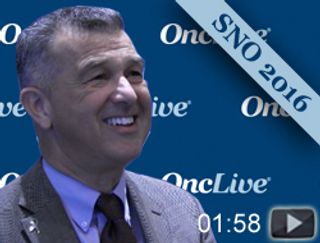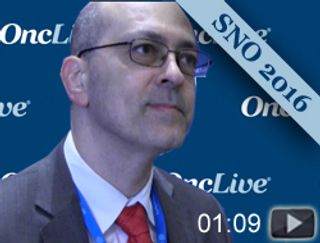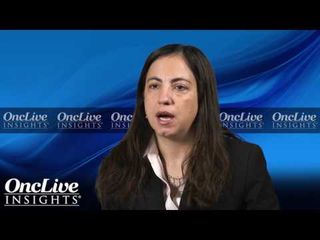
Brain Cancer
Latest News

Zotiraciclib Plus Temozolomide Shows Meaningful Efficacy in Recurrent High-Grade Gliomas

FDA Grants 3 Rare Pediatric Disease Designations to STAT3 Inhibitor WP1066
Latest Videos

CME Content
More News

December 22, 2020 — The FDA has approved an investigational new drug application for berubicin for the treatment of patients with glioblastoma multiforme.

November 18, 2020 - The FDA has granted a fast track designation and an orphan drug designation to the orally bioavailable small molecule tubulin-binding agent PTC596 for potential use in patients with leiomyosarcoma; the agent also received a rare pediatric disease designation and an orphan drug designation for potential use in patients with diffuse intrinsic pontine glioma.

November 17, 2020 - AV-GBM-1, a personalized cancer vaccine, demonstrated an improvement in progression-free survival in patients with newly diagnosed glioblastoma.

Zarnie Lwin, MBBS, FRACP, discusses the design of the phase 2 LEAP-005 trial in previously treated patients with advanced solid tumors.

The FDA has granted an orphan drug designation and rare pediatric disease designation to the bispecific antibody nivatrotamab for the treatment of patients with neuroblastoma.

The FDA has issued a Refusal to File letter regarding the biologics license application for the investigational B7-H3–targeting monoclonal antibody omburtamab for the treatment of pediatric patients with central nervous system/leptomeningeal metastasis from neuroblastoma.

Adilia Hormigo, MD, PhD, discusses the current treatment landscape of glioblastoma.

The investigational immunotherapeutic ERC1671 in combination with granulocyte-macrophage colony-stimulating factor, cyclophosphamide, and bevacizumab showed promising activity in patients with recurrent glioblastoma.
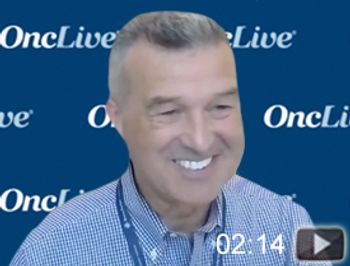
David A. Reardon, MD, discusses the design of a phase 1/2 trial with INO-5401 and INO-9012 in glioblastoma.

The FDA has granted a fast track designation to paxalisib for the treatment of patients with glioblastoma.

David A. Reardon, MD, discusses the role of INO-5401 and INO-9012 in glioblastoma.

The biologics license application for the investigational B7-H3–targeting monoclonal antibody omburtamab for use in pediatric patients with central nervous system/leptomeningeal metastases from neuroblastoma has been submitted to the FDA under the agency’s Rolling Review process.

The FDA has granted a fast track designation for the PKCβ inhibitor enzastaurin for the treatment of patients with newly diagnosed glioblastoma.

Efforts are underway to expedite the identification of therapies that offer promise for patients with glioblastoma

A biologics license application has been submitted to the FDA for omburtamab, previously referred to as burtomab, for the treatment of pediatric patients with central nervous system/leptomeningeal metastases from neuroblastoma.

The FDA has granted an orphan drug designation to berubicin for the treatment of patients with malignant gliomas.

The FDA has granted a priority review designation to a biologics license application for the investigational, humanized monoclonal antibody naxitamab (Danyelza) for the treatment of patients with relapsed/refractory high-risk neuroblastoma.

Investigators of the first global adaptive phase 2/3 GBM Adaptive Global Innovative Learning Environment platform trial are implementing a multiarm, 2-stage approach to concurrently evaluate single-agent and combination regimens in glioblastoma.

AV-GBM-1 showed early promise in an interim overall survival analysis of an ongoing phase II trial in patients with newly diagnosed glioblastoma.

Treatment with paxalisib, an investigational small molecule inhibitor of the PI3K/AKT/mTOR pathway, was associated with a positive overall survival signal in patients with glioblastoma.

A Biologics License Application has been filed with the FDA for naxitamab for the treatment of patients with relapsed/refractory high-risk neuroblastoma.
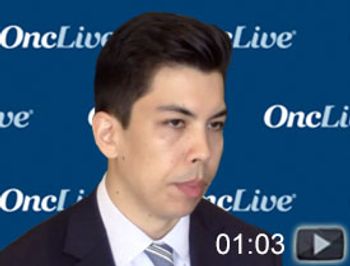
Connor Liu, medical student, Washington University School of Medicine, discusses the importance of combination immunotherapy in orthotopic murine glioblastoma.

Single-agent vorasidenib or ivosidenib led to brain penetrance and 2-hydroxyglutarate suppression in patients with low-grade glioma who harbor IDH1 mutations.

The combination of INO-5401 and INO-9012 with cemiplimab, plus chemoradiation, demonstrated promising 6-month progression-free survival rates in patients with newly diagnosed glioblastoma multiforme that is O6-methylguanine-DNA methyltransferase methylated or unmethylated.

Treatment with Toca 511 and Toca FC did not improve overall survival compared with standard therapy in patients with recurrent high-grade glioma undergoing resection, missing the primary endpoint of the phase III Toca 5 trial.





